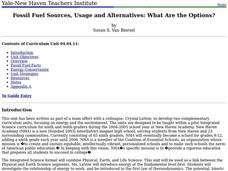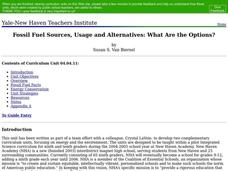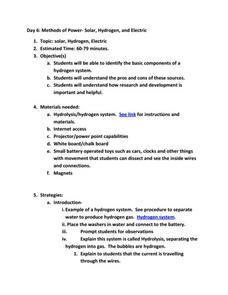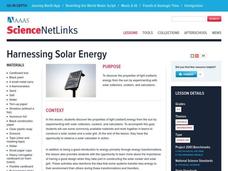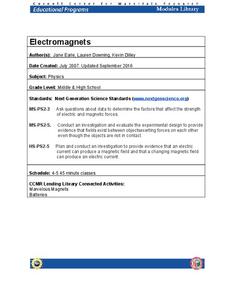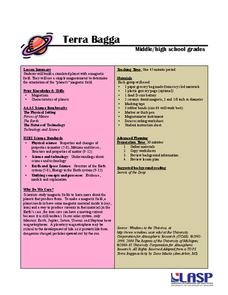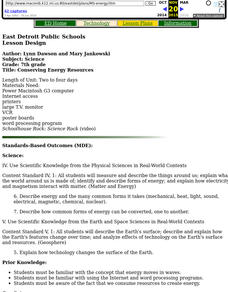Curated OER
Applied Science -Physics (2B) Pre Lab
Second graders look at different types of energy. In this energy activity, 2nd graders define energy and the difference between kinetic and potential energy. They see examples with falling books and a slinky.
Curated OER
The Power of the Plug: How Electricity Will Change Our Lives... Again
Students study electricity. In this physics instructional activity, students review electrical energy by discussing three ways of generating it. Students explore various energy sources used for creating electricity and examine how...
Curated OER
Electrical Generators
Learners study what an electric generator does and its history. For this energy lesson students complete several experiments including building their own electric generator.
Curated OER
Fossil Fuel Sources, Usage and Alternatives: What are the Options?
Students identify the different sources of fossil fuels. In this environmental science lesson, students research about how these impact our environment. They explore renewable energy sources that could replace fossil fuels.
Curated OER
Fossil Fuel Sources, Usage and Alternatives: What Are the Options?
Students examine the relationship between energy and the environment. In groups, they participate in experiments to discover the law of thermodynamics and the differences between potential, kinetic and mechanical forms of energy. They...
Curated OER
Methods of Power- Solar, Hydrogen, and Electric
Students examine solar, hydrogen, electric power. In this research based instructional activity, students will do simple investigations, view videos, discuss, and research how these three types of energy are used for power. They...
Curated OER
New Year's Resolution
Students brainstorm ways they can reduce their energy consumption and then create New Year's Resolutions with their families to put these conservation plans into action.
Curated OER
Magnetic Attraction
Second graders create a hypothesis on what objects will attract to magnets. In this magnets lesson plan, 2nd graders use a computer program to create a hypothesis as to what will attract or unattract magnets. For an extension, they test...
Curated OER
Harnessing Solar Energy
Students identify the properties of light from the sun. In groups, they participate in experiments with solar collectors, cookers and calculators to determine which one harnesses the most energy. They record their observations and...
University of Colorado
The Jovian Basketball Hoop
A radio receives radio signals, converts them to an electrical signal, then converts this signal to a sound signal, and amplifies the sound so people can hear it. Class members use this information to create a short-wave radio antenna...
University of Colorado
The Jovian Basketball Hoop
Can you listen to Jupiter on a simple radio? Turns out the answer is yes! The resource instructs scholars to build a simple radio to pick up the radio waves created when the charged particles from the sun hit Jupiter's magnetic...
PBS
Inspector Detector
How do spacecraft detect magnetic fields? The fourth installment of a five-part unit has learners develop a device with magnets that allows for the detection of magnetic fields. They use a map of an imaginary planet to try out their...
Cornell University
Electromagnets
Discover the connection between electric current and magnets. Scholars create electromagnets by passing a magnet through a coil. They experiment with different materials to determine the variables that affect the strength of the current.
University of Colorado
Terra Bagga
Earth's magnetic poles switch positions about every 200,000—300,000 years. In the activity, groups create a planet with a magnetic field. Once made, they use a magnetometer to determine the orientation of the planet's magnetic field....
University of Colorado
Terra Bagga
One way to identify possible volcanic activity on other planets is by testing the planet for magnetism. A science lesson begins with pupils constructing their own planet from a dead battery, magnets, paper, and tape before labeling the...
Messenger Education
Give Me a Boost—How Gravity Assists Aid Space Exploration
The propellant needed for space explorations runs in the thousands, while paying to get the craft into orbit costs millions! In the second installment of three, two activities explore laws of conservation of energy and momentum. Using...
Curated OER
Ion (Derstand) Bonding through Energy Level Diagrams
Ninth graders investigate ionic bonding through energy level diagrams. In this ion bonding lesson plan, 9th graders observe demonstrations to show energy level diagrams using magnets to represent the subatomic particles. Students fill...
Curated OER
Exploring Magnetism
Eighth graders study magnetism. In this solar wind lesson students complete several activities on space and weather.
Curated OER
Marvelous Magnets
Students identify and classify magnetic and nonmagnetic materials and metals. After determining which materials and metals are magnetic, students create a data table and classify items by two different criteria. Students e-mail various...
Curated OER
Alternative Energy
Students identify the five major alternative energy sources. In this physical science lesson, students assess the advantages and disadvantages for each type of energy. They complete a concept map using information they researched.
Curated OER
Do It Yourself: Energy Transfer Lesson Plan
Fifth graders discuss the different types of energy and experiment with tesla coil to show the three types of energy transfer. They write conclusions in their science journal.
Bonneville
Solar Pathfinder Tutorial
Find the right path to learn about solar energy. Scholars set up and use Solar Pathfinders to take measurements related to solar insolation at a particular site. Based on the data, they estimate the solar potential in kWh/m^2/day of a...
Science Matters
Motors
It's time to get moving! The 13th lesson in a 14-part unit on electricity and magnetism explores the relationship between electricity and mechanical energy. Budding scientists build motors and experiment with different components to...
Curated OER
Conserving Energy Resources
Seventh graders research on energy conversion. After they have researched several types of energy resources, teams of two to four create posters which depict how these resources can be conserved.





